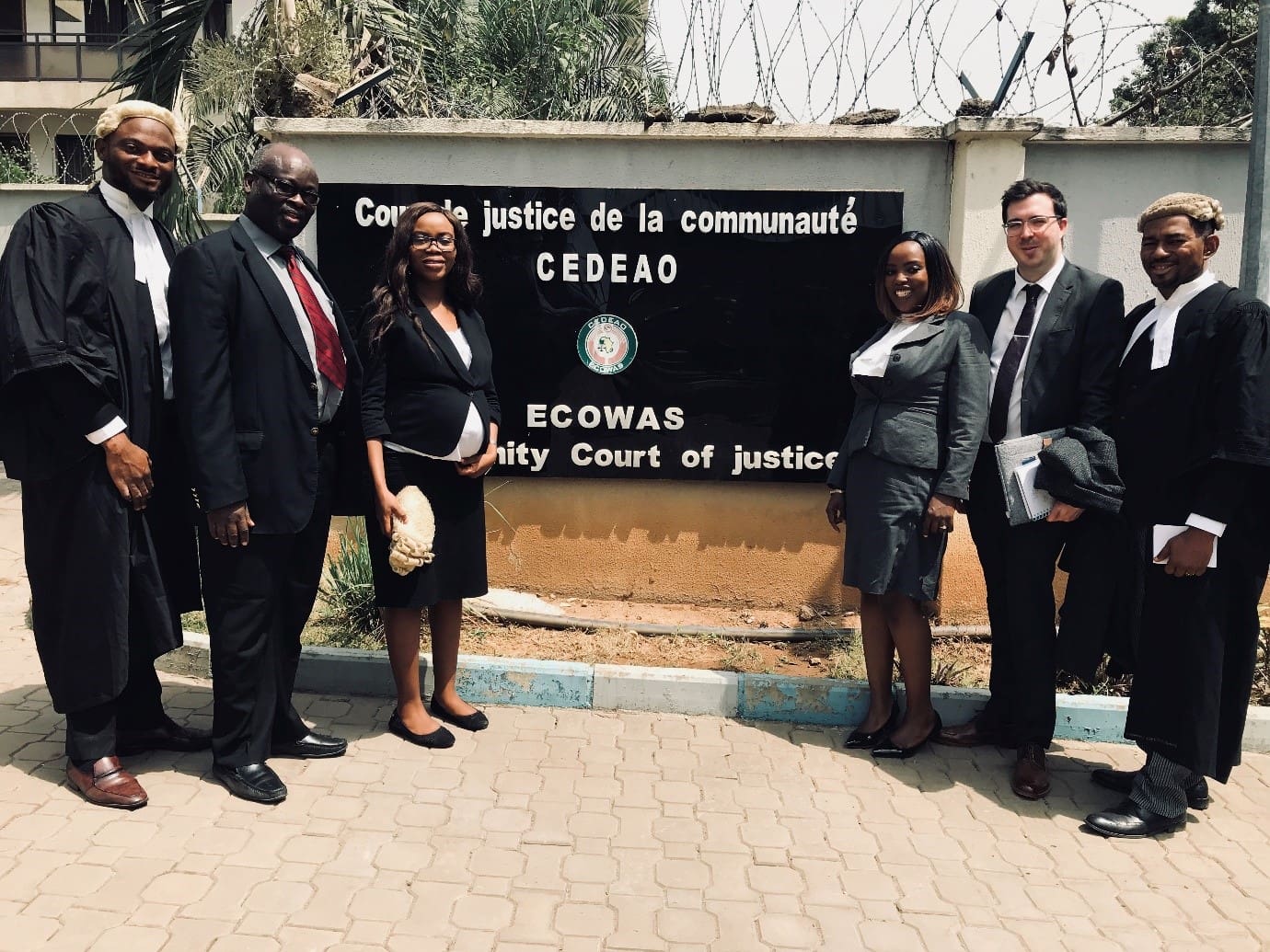On 14 February 2018, the Court of Justice of the Economic Community of West African States (ECOWAS) delivered a landmark judgment (available below) in which it found that the rights of four Gambian journalists had been violated by the actions of the Gambian authorities, and through the enforcement of laws criminalising speech. The judgment also recognised that the criminal laws on libel, sedition and false news disproportionately interfere with the rights of Gambian journalists and directed that the Gambia “immediately repeal or amend” these laws in line with its obligations under international law.
“This is a significant judgment, not only for the Gambia but also for the West African region as a whole,” said Jonathan McCully, our former Senior Legal Officer, who was present at the hearing. “The ECOWAS Court expressed in the strongest terms the crucial role that the media play in society, and unequivocally condemned the enforcement of criminal laws against journalists for carrying out this role.”
We worked with a team of international and Nigerian lawyers to file the case in December 2015 on behalf of four exiled Gambian journalists who had been arrested and detained by the Gambian authorities because of their journalistic work, and who later fled the country out of fear of further persecution. Two of the journalists were also subject to torture whilst in the custody of the National Intelligence Agency following their arrests. The case was also brought in the name of the Federation of African Journalists, which acted as a representative of all Gambian journalists whose rights have been, and continue to be, violated by the maintenance of criminal laws on libel, sedition and false news.
In its judgment, the ECOWAS Court held that the arrest and detention of the four Gambian journalists amounted to violations of their rights to freedom of expression, liberty and freedom of movement. The ECOWAS Court also recounted in detail the torture that was inflicted on two of the journalists, which included beatings, detention in poor conditions, and the infliction of electric shock. It relied on the testimony of the journalists, as well as independent medical evidence provided with the assistance of the International Rehabilitation Council for Torture Victims, to conclude that there had been a violation of the prohibition on torture.
The ECOWAS Court also considered the “root” cause of the claims brought before it, namely the Gambian criminal laws on libel, sedition and false news. It quoted extensively from jurisprudence of the African Court on Human and Peoples’ Rights, the Inter-American Court of Human Rights, and the United Nations Human Rights Committee, in reaching the conclusion that these laws were “obvious” and “gross” violations of the right to freedom of expression. The Court indicated that it was particularly important that laws applicable to speech be “narrowly drawn” because of the “chilling effect” that can be caused by vagueness or imprecision.
“At the time this case was filed, the Gambian media were operating in a climate of fear with journalists being arrested, detained, tortured, and even murdered for simply carrying out their work.” Said Jonathan McCully, “this judgment is an important means to achieving redress for journalists whose rights had been violated under the previous regime of Yahya Jammeh, and for securing a favourable environment for journalists in the Gambia. We hope that the Gambia will implement this decision without delay.”
“This judgment provides an impressive overview of international norms on freedom of expression and the media,” observed Gabriel Baglo, General Secretary of Federation of African Journalists, who was also in attendance, “as reform is already underway in the Gambia, we hope that the decision of the ECOWAS Court will be fully taken into consideration by those responsible for reform of the media law.”
Noah Ajare, the lawyer representing the Applicants, said “this is a landmark judgment that will benefit journalists and freelancers across the continent, who have seen journalists systematically tortured and dehumanised over the years in the Gambia. I commend the boldness of the justices of the ECOWAS Court in delivering this extraordinary and epoch-making judgment.”
The Applicants were also represented by London-based barristers Can Yeginsu and Anthony Jones.
Amicus briefs were also filed on behalf of REDRESS, the UN Special Rapporteur on Freedom of Expression, and a coalition of eight free speech organisations.
Attached files:
![]() ECOWAS Judgment
ECOWAS Judgment
Recent News
Landmark Ruling: Kenya’s High Court Declares Colonial-era Subversion Laws Unconstitutional
Media Defence welcomes the verdict of the High Court in Nakuru, striking down sections of the Kenyan Penal Code which criminalise subversion, citing them as relics of colonial oppression that curtail freedom of expression. Justice Samwel Mohochi, delivering the judgment, asserted that these provisions were overly broad and vague, stifling dissent rather than serving any […]
UN Rapporteurs Call for Protection of Brazilian Journalist Schirlei Alves
UN Rapporteurs Call for Protection of Brazilian Journalist Schirlei Alves Amid Defamation Charges Stemming from Rape Trial Coverage A letter dispatched by UN rapporteurs to the Brazilian Government calls for protective measures for women journalists covering cases of sexual crimes. The letter also denounces the conviction of Brazilian investigative journalist and women’s rights defender, Schirlei […]
Convite à apresentação de candidaturas: Cirurgia de litígio em português na África Subsariana
Cirurgia de litígio em português na África Subsariana Aplique aqui 23 a 25 de julho de 2024 em Nairobi, Quénia Prazo: 3 de maio A Media Defence está a convidar advogados sediados na África Subsariana que falem português a candidatarem-se a participar numa próxima cirurgia de litígio sobre o direito à liberdade de expressão e […]



